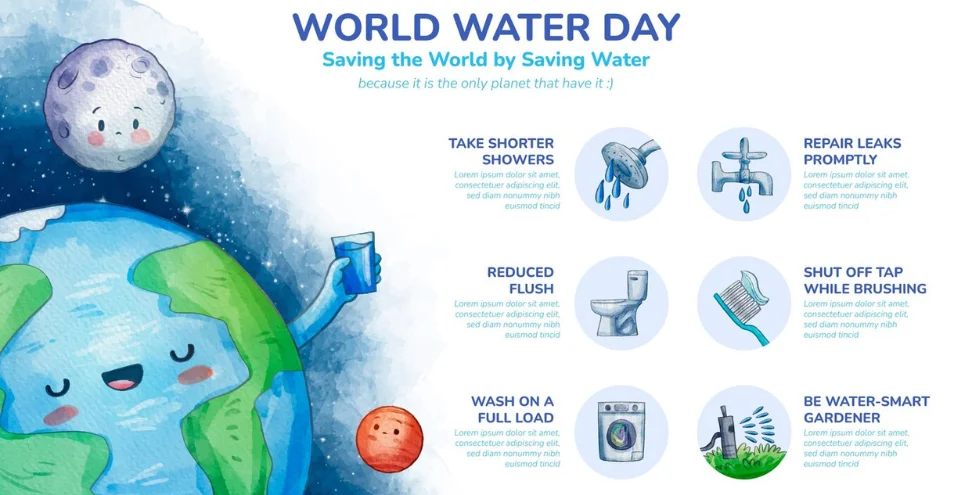Why We Should Save Water: An Easy-to-Understand Guide
500+ Words Essay on Why We Should Save Water
Water is one of the most important resources on our planet. It is essential for the survival of all living things—humans, animals, and plants alike. Although there is a lot of water in the oceans, only a small portion is fresh water that we can drink and use. As our population grows and our environment changes, saving water has become a significant challenge. In this guide, we will discuss why saving water is crucial, what happens when we waste it, and some simple tips to help conserve water.
The Importance of Saving Water
Water is vital for everyday life. We need it for drinking, cooking, cleaning, and even for growing food. It is also important for generating energy and keeping ecosystems healthy. Without enough water, plants and animals cannot survive, and humans would face great struggles.
Unfortunately, water is becoming harder to find in many parts of the world. Over 2 billion people live in areas where clean water is scarce. Most of the world’s water is used for agriculture growing crops and sometimes too much of it is wasted in the process, leading to shortages. If we don’t start saving water now, we could face serious problems in the future for people, the environment, and the economy.
Simple Ways We Can Save Water
Saving water is easier than it seems. Here are some simple actions you can take every day to save water:
1. Turn Off the Tap: Don’t leave the water running while you brush your teeth or wash dishes. This small change can save a lot of water over time.
2. Fix Leaks: A little drip from a faucet or pipe can waste hundreds of liters of water each year. Fixing these leaks can make a big difference.
3. Use Water-Efficient Appliances: Installing low-flow showerheads, faucets, and water-saving toilets can help you save water at home.
4. Full Loads Only: When washing clothes or dishes, wait until you have a full load. This way, you’ll use less water than if you wash smaller amounts.
In farming, new practices like drip irrigation and rainwater harvesting help save water too. Drip irrigation delivers water directly to the roots of plants, reducing waste. Rainwater harvesting collects rainwater for later use, so we rely less on fresh water.
The Benefits of Saving Water
Saving water comes with many advantages:
For Future Generations: By saving water today, we ensure that our children and grandchildren will have enough clean water in the future.
Protecting Nature: Using less water means we help preserve rivers and lakes that are home to many plants and animals.
Saving Energy: It takes a lot of energy to treat and transport water. When we use less water, we also save energy, which helps our planet.
Saving Money: Lowering your water usage can reduce your water bills. This can be especially helpful in areas where water is expensive.
Conclusion
In summary, water is a precious resource that we need to protect. Every time we use water wisely, we help ensure that it will be available for future generations.
Whether it's turning off the tap, using water-saving devices, or encouraging others to be mindful of their water usage, we can all make a positive impact. Let’s work together to save water and help our environment!
Frequently Asked Questions (FAQs)
1. Why is it important to save water?
Water is crucial for drinking, cooking, cleaning, and keeping nature healthy. With more people on Earth and fewer fresh water sources, we need to save water to make sure future generations can enjoy it too. It also helps protect the environment and reduces the energy used for water treatment.
2. What are some easy ways to save water at home?
- Turn off the tap while brushing your teeth or washing dishes.
- Fix any leaks in faucets or pipes.
- Use water-saving appliances like low-flow showerheads and toilets.
- Take shorter showers and wash only full loads of clothes or dishes.
3. How does saving water help the environment?
Saving water keeps rivers, lakes, and wetlands healthy, which are important for wildlife. Using less water also means less energy is needed for treating and transporting water, helping to reduce pollution and fight climate change.
4. Can saving water save money?
Yes! By using less water, you can lower your water bills at home. Water-efficient appliances also help save money. In areas where water is scarce, conserving water can reduce costs associated with water treatment.






































Post a Comment